Common as Muck
The common pigeon as a metaphor for the Holy Spirit? Six reasons why we should stop looking for doves, and start noticing pigeons. By Ruth Whiter
 As I grew up and developed an interest in both Christianity and graphic design, I began to feel slightly guilty about my distaste for the pretty white or pastel coloured doves that were often used as a symbol of charismatic renewal in the 1980s and 1990s.
As I grew up and developed an interest in both Christianity and graphic design, I began to feel slightly guilty about my distaste for the pretty white or pastel coloured doves that were often used as a symbol of charismatic renewal in the 1980s and 1990s.
After all, had not God himself ordained the use of this ‘logo’ for the Holy Spirit, when he sent a dove to alight on Jesus after his baptism?
I was somewhat relieved, then, when my present minister presented us with an alternative. He’s a competent birdwatcher who has spent time in the Holy Land.
He had also read Michael Mitton’s book Wild Beasts and Angels, which points out that when John the Baptist described this event (John 1:32-34) he would have used the word ‘dove’ to mean the grey, black, and emerald Rock Dove, common in the Middle East and also around our own coastlines.
This species, Columba Livia, was domesticated as a source of food, before returning to the wild, where it has thrived as the common feral pigeon.
Ever since this revelation, I’ve been much more aware of pigeons, and allowed their presence to remind me that the infilling Jesus experienced that day was not something rare or unattainable.
In fact, I think there are several reasons why the common pigeon makes a great metaphor for the third person of the Trinity. Here are just six:
Pigeons are everywhere
Just as the prophet Joel predicted that in the last days God would pour out his Spirit on all people, in these days the feral pigeon has colonized the entire globe. A map showing pigeon distribution across the world shows almost every land mass and island shaded – I can’t find any other bird this is true of. You will rarely step outside your home without encountering a pigeon.
Often as I cycle to work, a pigeon will swoop down and fly before me for just a few seconds, an unobtrusive guide and companion, never pinned down, but near at hand. This helps me to remember that as Jesus promised, he is always with me through the presence of his Spirit.
Pigeons are usually ignored
If you watch any human who is watching birds, whether a child by a duckpond, a twitcher in a hide, or a gardener looking out at her bird table, it’s a safe bet that any pigeon present will remain more or less invisible to the viewer.
Do you think we sometimes pray earnestly for an appearance by the rare white dove, when the faithful pigeon has been there all along, hiding in plain sight? Like our own breath, which is also synonymous with the Spirit in scripture, we are healthier if we allow ourselves to be aware of, and make space for, the work of the Spirit within and among us.
Pigeons get hurt
I’ve seen city pigeons with all kinds of battle damage – broken wings, missing feet or claws, and the occasional one that simply hasn’t been able to remove the chewing gum it stepped in.
Paul warns us not to ‘grieve the Holy Spirit’ in Ephesians 4:30, but surely many of us do, to a greater or lesser extent. If Jesus’ incarnation led to abuse, spit, thorns, and ultimately the cross, do we imagine that the Spirit is immune to the pain and anguish of living among sinful humans?
Pigeons make a mess
Have you ever thought that the spikes, nets, and other measures put in place to keep pigeons away from town centre buildings look uglier than their droppings would?
I’m sure there are good reasons for protecting buildings in that way, but what about our churches? Perhaps we are sometimes so concerned to keep everything manageable, tidy, and ordered, that the Spirit cannot get close enough to set our hearts on fire. I work alongside a Regional Ministry team who support and enable churches who are following God’s call to begin something new, and this can, in my experience, be a rather messy business.
Pigeons are effective messengers
Everyone knows that pigeons make good messengers. In the Second World War, in an age when instant communication was already possible using the telegraph and telephone, the United Kingdom used about 250,000 pigeons for military purposes.
Pigeons can fly without the aid of technology, giving them a different perspective on a situation. The presence of the Holy Spirit with us means that God’s perspective on our situation is always with us, and that very often, God will find a way to communicate that perspective to encourage, warn, or direct us.
The idea for this article began during the first editorial meeting of this edition of Baptists Together. As we discussed how the Holy Spirit equips us, we were all startled by a loud thump on the window, and for a moment had no idea what was happening. Then someone commented: “It’s OK, it’s just a pigeon.”
Pigeons go to places we avoid
 Michael Mitton points out that the rock dove is content to roost in dark, damp caves, and likewise town pigeons are commonly found in concrete underpasses and the messy places where those we might view as being on the margins gather, whether that’s skateboarders, street dwellers, or those trapped in addiction.
Michael Mitton points out that the rock dove is content to roost in dark, damp caves, and likewise town pigeons are commonly found in concrete underpasses and the messy places where those we might view as being on the margins gather, whether that’s skateboarders, street dwellers, or those trapped in addiction.
Recently I watched a pigeon fly into a dark tunnel, above which humans had fixed the sign DO NOT ENTER THIS TUNNEL. We know from the gospels that we would find Jesus with no go people in no go places, so we should expect to find his Spirit working in those places too.
The Prophet Joel makes it very clear that when the Spirit is poured out on all people, that will mean all people (Joel 2:28-29). He deliberately includes women and servants and women who are servants, because he knows our tendency to assume the exclusion of certain groups when we imagine God’s work among human beings.
It’s interesting to note that a particular love for pigeons can itself place you on the margins of society.
You can see this in the portrayal of ‘Bird Ladies’ in Mary Poppins and Home Alone 2. Bath’s Pigeon Man, who offers tourists a photo opportunity with his feathered friends outside the Pump Room, before thoughtfully offering them a hand sanitizer and a bucket for their coins, is playing the role of the outsider and the fool.
If our world is to notice and encounter the Spirit God has lavishly poured out on all people in these days, perhaps that’s what we need to be.
Author and illustrator Ruth Whiter is communications co-ordinator for the West of England Baptist Association. The illustrations in this article are hers.
Baptists Together, 05/09/2015